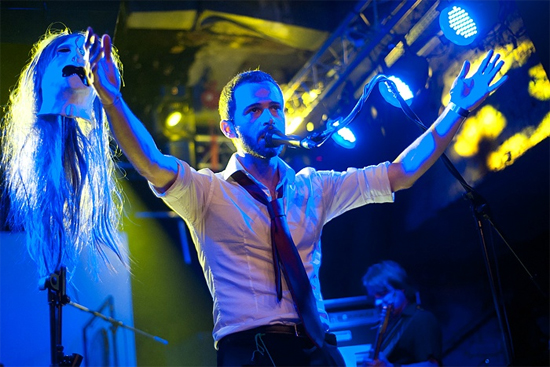As we stand, balanced on a particularly ill constructed piece of garden furniture, peering through the narrowest of gaps between the top of people’s heads and the top of the hole-through-a-concrete-wall that serves as a door to the tiny room in which Italian jazz/tribal/metal trio Mombu are playing, The Quietus can’t help but ponder this joke from the most recent, particularly underwhelming, series of Shooting Starts: "True or false: 90 percent of Daily Mail readers think that Poland is empty". The reason for this ill advised pondering is that we find ourselves precariously ensconced inside the belly of the largely disused, 19th century Browar Mieszczanski brewery in Wroclaw, south western Poland, awaiting the arrival on stage of another (mostly) Italian group Obake.
For far too long now the default opinion of Eastern Europe held by great swathes of people – often those whose opinions are informed by what they read in one of the Murdoch owned rag sheets – is that the entire population are poorly trained plumbers that will eventually come over here and take our jobs; that countries such as Poland are somehow culturally backwards. Of course that could barely be further from the truth; in fact there could almost scarcely be a more appropriate place to experience the constantly fluctuating, mostly improvised onslaught of Obake that right here in Wroclaw.
As we pointed out in this review of their self titled debut Obake’s sound, whilst only loosely best described as avant-metal, is a continually morphing entity, totally appropriate to their moniker, a cross pollination of everything from oppressive doom riffs and prickly waves of ambient noise to almost operatic cadences – whilst containing aspects of the familiar the collision of those aspects serves to create something far more unique that the sum of its parts. Having at various points in its history been part of Bohemia, Prussia, Germany and Austria and with architecture that ranges from 13th century cathedrals and gothic churches to soviet housing blocks and the unfortunately common modern glass office buildings, the almost ineffable, familiarly alien feel of the city could hardly be better matched to Obake tonight.
It’s a long wait before the band finally appear onstage at the frankly ludicrous time of 1:15am, yet when they do – with drummer Balazs Pandi and stand in bassist Trevor Dunn clutching the torso and leg from a shop dummy and vocalist Lorenzo Esposito Fornasari positioning a ghoulish, glowing eyed head on a stick at the front of the stage you immediately get the sense you’re in for something special. The disused brewery which serves as tonight’s venue for the most part seems an odd choice of location, with the main stage area especially being in actuality more of a wide corridor, yet as Obake lurch into the opening riff of ‘Destruction Of The Tower’ Eraldo Bernocchi’s distorted baritone guitar and Fornasari’s gravelly, hushed vocals seem to swarm and coalesce around the stage before being violently funnelled down the narrow room by the insanely loud PA, like some sort of soul-peeling back draft.
Tonight marks the final date of the bands short(ish) European tour and it’s clear that the relationship between the four musicians has grown to near psychic levels. Trevor Dunn had never actually played with the group before flying out to meet them at the start of the tour, yet tonight as Obake indulge in their customary improvisations based loosely around numbers from the album, he and Bernocchi play off one another with such understanding that a spontaneous move towards some mangled Kiss riffs fits perfectly into a set that veers from quivering, narcotic noise to brutal, engrossing riffs and even a bizarrely chilled near-reggae jam.
By the time the band return for an encore and close their hour long set with a crescendo of feedback drenched, skull-fucking noise and yet more bowl haemorrhaging riffs, The Quietus (and possibly everyone else, we don’t speak Polish so it’s hard to tell) is simply left to reflect that reputation, expectation and perceived ideas of ‘what’s right’ are in reality very empty concepts.



